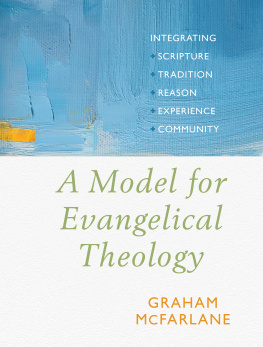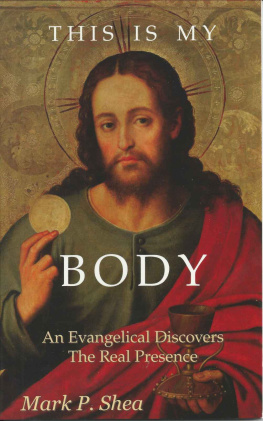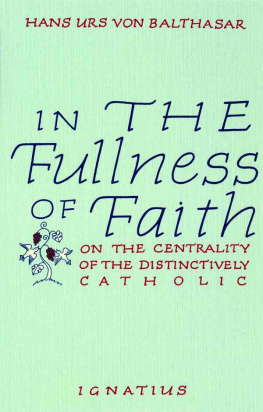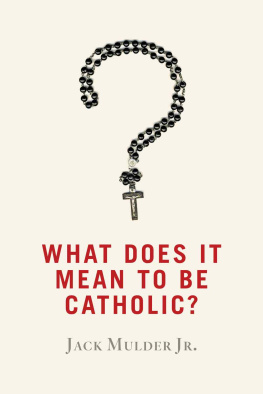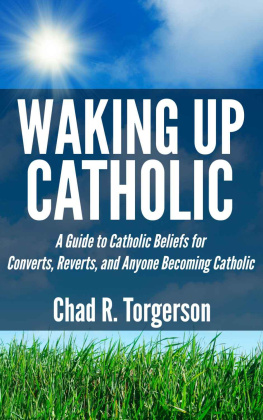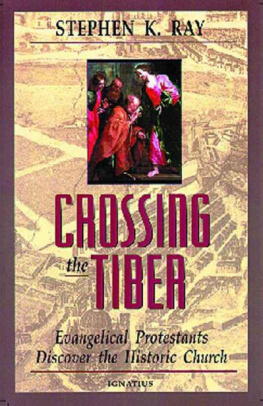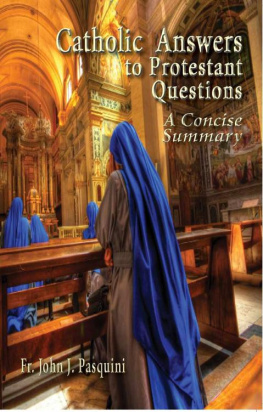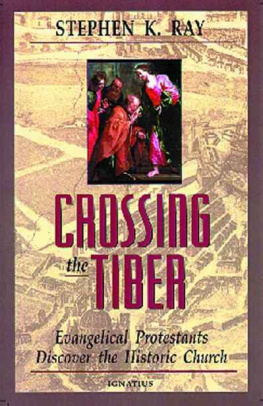BY WHAT AUTHORITY?
Mark P. Shea
By What Authority?
An Evangelical Discovers Catholic Tradition
Revised and Expanded Edition
IGNATIUS PRESS SAN FRANCISCO
First edition 1996 by
Our Sunday Visitor Publishing Division
Our Sunday Visitor, Huntington, Indiana
Unless otherwise indicated, Scripture selections are taken from the Holy Bible, New International Version , copyright 1973, 1978, 1984 by International Bible Society. Used by permission of Zondervan Bible Publishers. Scripture selections in this work marked NAB are taken with permission from the New American Bible , copyright 1991, 1986, 1970 by the Confraternity of Christian Doctrine, Washington, D.C., 20017, and are used by license of the copyright owner. All rights reserved. Selections marked NRSV are from the New Revised Standard Version Bible , copyright 1989 by the Division of Christian Education of the National Council of Churches of Christ in the U.S.A., and are used by permission of the copyright owner. Selections marked RSV are from the Revised Standard Version Bible, Catholic Edition , copyright 1965 and 1966 by the Division of Christian Education of the National Council of the Churches of Christ in the U.S.A., and are used by permission of the copyright owner. Selections marked KJV are from the Holy Bible, King James Version .
Cover art
The Calling of St. Peter
From a series of scenes of the New Testament (fresco)
Barna da Siena (fl. 1350-55)
Collegiata, San Gimignano, Italy
Alinari / The Bridgeman Art Library
Cover design by Milo Persic
2013 by Ignatius Press, San Francisco
All rights reserved
ISBN 978-1-58617-782-9
Library of Congress Control Number 2013930574
Printed in the United States of America
To Father Michael Sweeney, O.P.,
Father and Friend
CONTENTS
FOREWORD
Just a year or so before his much-publicized conversion, Tom Howard expressed his own growing sense of Protestant inadequacy in a work aptly entitled Evangelical Is Not Enough . Mark Sheas new book, By What Authority? though clearly not intended as a sequeldelivers the positive follow-up message: Evangelical and Catholic are enough.
I suspect that different readers may react very differently to that last statement. On the one hand, a stalwart Protestant may take it to be an oxymoron (Evangelical Catholics are like married bachelors). On the other hand, a traditionalist Catholic may be wondering why Evangelical is even needed (Catholic is enough by itself).
In this luminous treatment of religious authority, Mark Shea shows how both terms actually imply each other. Thus, to be fully consistent with Scripture, an Evangelical will become a Catholicjust as a faithful adherence to Catholic tradition calls for a truly Evangelical commitment and witness. As a reader, I guarantee that you will be challenged by such a balanced yet forceful approach (Evangelical and Catholicboth or neither).
There are other qualities in this book that make it special. For one thing, Shea writes with considerable skill and wit. From start to finish, reading this book is a breeze. Given the tough and profound issues that Shea treats, plus the degree of difficulty in debating them fairly, attentive readers will gratefully give his writing style some very high scores.
Another strength of the book is its timeliness, especially in view of the much publicized Jesus Seminar, whose members (John Dominic Crossan, Robert Funk, etc.) have all become media sensations by employing a fundamentalist style of liberal exegesis (call it hysterical criticism) in order to reject as inauthentic the vast majority of sayings attributed to Jesus by the evangeliststo which Shea responds with gentle yet forceful persuasion. But the thing I like most about this book is the crystal clear and compelling case that Shea makeson the basis of logic, history, and Scripturefor sacred (big T) Tradition. It is simply the best that I have found.
Read this book carefully. And keep a pen and notepad nearby. I guarantee rich dividends for your investment of time and energy.
Dr. Scott Hahn
Father Michael Scanlan, T.O.R., Chair of Biblical
Theology and the New Evangelization
Professor of Theology
Franciscan University of Steubenville
PREFACE
As the editor of a nearly ten-year-old periodical dedicated to apologetics, I come across hundreds of articles from budding authors who think they are proposing something unique. And some do. One such writer was Mark Shea, who first submitted items for consideration a number of years back. Several things struck me about this convert-writers content and style. First, the subject matter was good and accurately presented; second, the mode of communication was fresh and vibrant; third, the author wrote from a perspective of faith, as well as from interesting, generally unexplored angles. This combination of factors has ensured that Mark would grace the pages of The Catholic Answer on many occasions.
When I heard that Mark had produced a book, I was pleased because I knew that all of the assets cited above would be in evidence in a full-blown study. When I discovered that his topic was Tradition, I was thoroughly delighted. Why? Because of all the neuralgic issues in apologetics and in ecumenical dialogue alike, no subject is more fundamental than that of Tradition.
Now, truth be told, there is no shortage of works on Tradition, so why another one? Because Mark has a marvelous way of backing into a sensitive topic. In this volume, he handles the formal study deftly by a most useful inductive methodology; what is particularly helpful is the autobiographical nature of his discovery of Tradition and its central role in Christian faith, revelation, and theology. Our author, you see, attempts to handle this crucial theme by appealing to head and heart at one and the same time. As an academic, as a writer, and as a pastor, I feel compelled to assert that he succeeds admirably.
Cradle Catholics, Evangelicals, and various other honest seekers will all find something of value and interest here. And they should enjoy themselves in the process as Mark Shea demonstrates that Tradition is no dead, desiccated fossil but the very lifeblood of Christianity G. K. Chesterton, a convert and lay apologist of the last century, once warned of how simple, basic things can become convoluted:
Step softly, under snow or rain,
To find the place where men can pray;
The way is all so very plain
That we may lose the way.
Mark Shea offers us a road map that puts and keeps all in focus, so that Catholics would not lose the way and others would be able to find it. He is an excellent tour guide because he has made the trip himself; he knows, both intellectually and affectively, the roadblocks and the shortcuts. I pray that you will appreciate this journey into the land of Tradition.
Rev. Peter M.J. Stravinskas, Ph.D., S.T.D.
Editor, The Catholic Educator
ACKNOWLEDGMENTS
This book is a product of collaboration with persons whose consciousness of their collaboration ranged from blank unawareness to omniscience. On the omniscience end of the scale I would cheerfully like to put my Lord and God, the Father, Son, and Holy Spirit, from whom, to whom, and through whom this book and all things exist. Blessed be he!
A little lower down the scale I would like to place my beloved Janet, whose enormous patience with and support of this project has made the impossible possible. Likewise, I want to thank our boys, Luke and Matthew, for sharing the computer with Dad.
Slightly less omniscient than my wife is the editorial whiz kid Sherry Weddell, whose typically incisive comments were as valuable as her steady stream of research resources. Thanks once again!
Also big on the editorial acumen scale are Sherry Curp, whose efficiency and compassion are no risk, and the following profoundly helpful and inspirational people who are listed, not according to omniscience, but according to alphabet:
Next page


